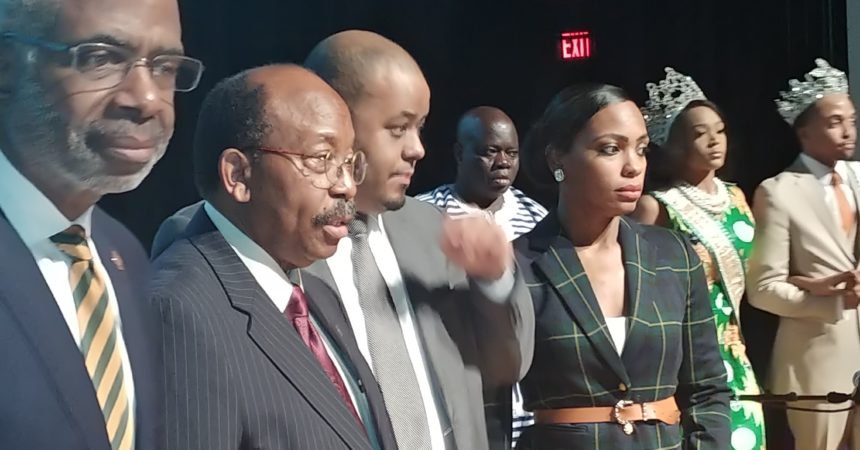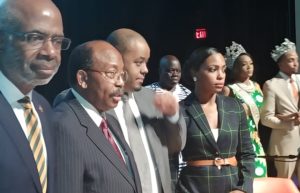
Panel discussion on Black vote energizes town hall crowd
By St. Clair Murraine
Outlook staff writer
Just about everyone who attended a two hall intended to get Blacks out to vote seemed rejuvenated by the lively conversation inside Lee Hall.
The overwhelming concern, though, was whether the message will go far enough to impact the 2020 election. There is too much at stake for Blacks for the vote to be ignored during the elections, all four panelists reiterated throughout the 90-mionute conversation about African Americans and the Vote.
“These are critical times,” City Commissioner Curtis Richardson said. “None participation is not an option. There are people who gave their lives.”

FAMU president Larry Robinson (left) joined a few member of the panel after their conversation about African Americans and the Vote.
Photo by St. Clair Murraine
FAMU President Larry Robinson issued the same reminder, telling the audience early in the program about the university being in front of several racist issues during the early years of the civil rights movement.
“We were not afraid,” he said.
Afterward he expressed hope that the enthusiasm in the room will carry over to the primaries and the November election.
“It just cannot stop at the doors of Lee Hall,” Robinson said. “We have to get people going out and carrying this banner: African Americans and their vote.”
In between outlining numerous racist practices by President Donald Trump, Darius Young, an associate professor of history, reiterated why Black need to get to the polls.
“We are not in a position that we can ignore the vote,” he said.
Young said Trump’s racist ways go back to when he carried out a campaign to get Barak Obama’s birth certificate after he was elected president. He said Trump even questioned Obama’s Harvard law degree from an Ivy League school.
“We are very much living within a society that Donald Trump has shaped to mirror his vision of how America should be,” Young said. “That’s to maintain the racial hierarchy of this nation.”
Larry Rivers, a historian and former president of Fort Valley State University, said Trump ran on a “make America great against” slogan that implies taking the country back to the 1940’s and 50’s when Blacks suffered injustices. Understanding that should be enough for Blacks to make voting a priority, he said.
“We have always heard the adage that a vote-less people is a hopeless people,” said Rivers, who wasn’t on the panel. “I think that convocations like this are not only good for the students but for the general public because it keeps an awareness of the importance of voting and participating in the political process. If you don’t vote you won’t select the people that represent your interest and if you don’t have people representing your interest they will represent other folks who may not have your interest at heart.”
On the subject of Trump’s reelection bid being a major concern for Blacks, John Warford, an assistant professor of geography, history political science at FAMU, said he shouldn’t be ignored.
“President Trump is a beacon for something that has been drawing attention for some time and has open expression,” Warford said. “So the question remains do you and I just operate in reactive mode and operate out of fear. The response has to be different now more than ever before because the challenge is right in front of us.”
For a few minutes during her talk, panelist Tiffany Loftin, NAACP National Director of youth and college division, had the audience doing some soul-searching when she asked about the a few of the primary dates. Many in the crowd seemed surprised.
She went on to beseech the audience to be cognizant about constant changes that are affecting the election process. In fact, she said, Black people have to be more involved in politics, making it known that more than 30 governors are pushing for a Constitutional convention to change the supreme law.
Kimberly Brown Pellum, another member of the panel and a FAMU assistant professor of history, made it a point of issuing a warning about superficial politicians.
“We have to make politicians campaign to us and not entertain us,” she said.
The key to bringing about change is to vote for candidates that want to make change for Black people was an overwhelming sentiment expressed by the panelists.
“It’s just something we cannot afford to take for granted,” Robinson said. “I hear people talking about this or that. If you want to change that you have to get out and vote.”







